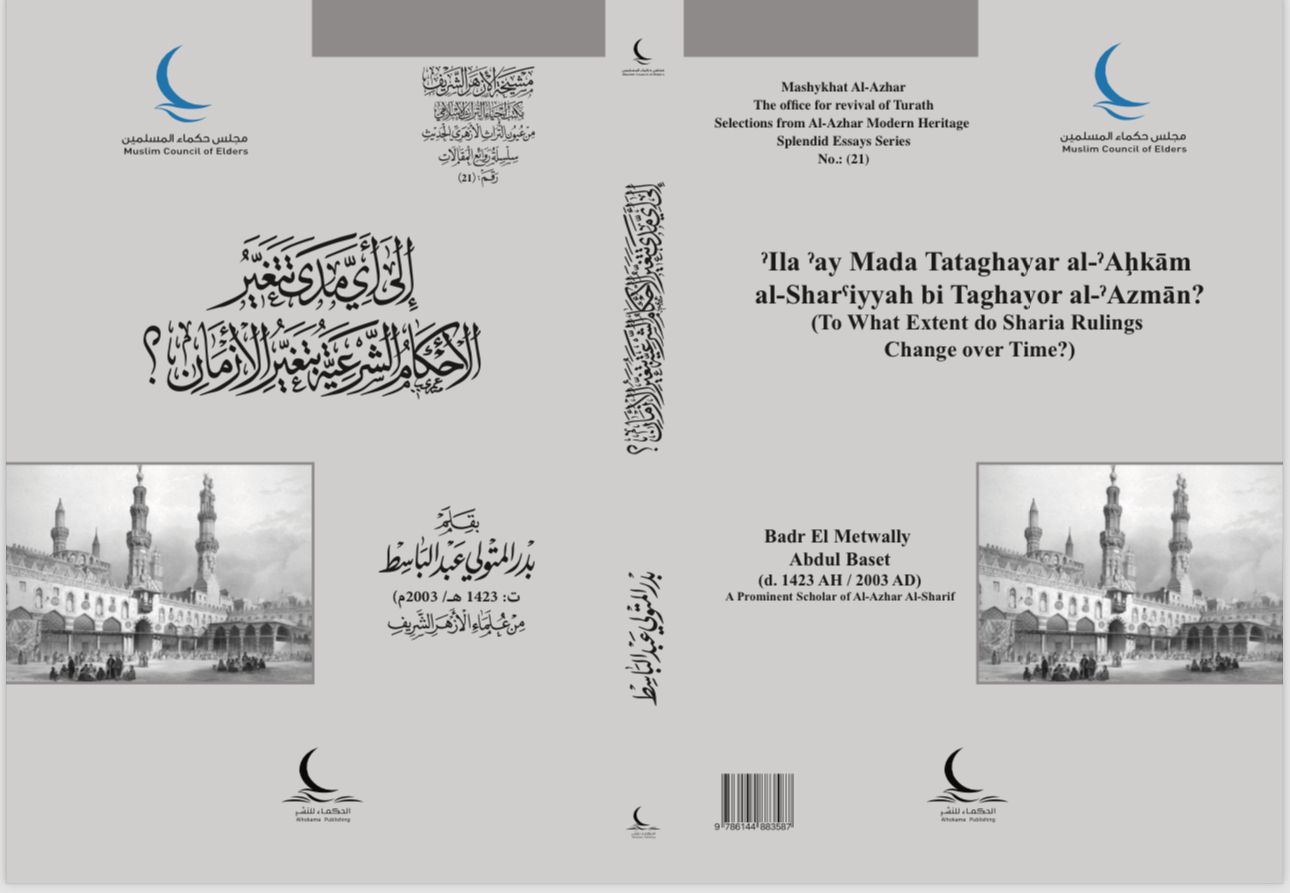"To What Extent Do Sharia Rulings Change Over Time?" - The Latest Release from the Muslim Council of Elders' Pavilion at the Cairo International Book Fair 2024
"To What Extent Do Sharia Rulings Change Over Time?" - The Latest Release from the Muslim Council of Elders' Pavilion at the Cairo International Book Fair 2024
The Muslim Council of Elders' Pavilion at the Cairo International Book Fair 2024 presents to its visitors the book "To What Extent Do Sharia Rulings Change Over Time?" written by the Scholar Badr El Metwally Abdul Baset, of Al-Azhar.
The book comprises a collection of ancient philosophical thoughts discussing a contemporary and crucial topic: the evolution of legislation and its relevance to every era and place, along with the adaptability of its branches. The author, an eminent scholar and a figure involved in issuing fatwas in Egypt and beyond, Professor and Scholar Badr El Metwally Abdul Baset, addressed the issue of the philosophical and dangerous aspects of the evolution of legal judgments. His discussions were based on his extensive experience and the endorsement of his opinions on many issues deliberated by the jurisprudential councils. These scholarly articles were published sequentially in the Al-Azhar Magazine.
In these articles, Sheikh Badr El Metwally Abdul Baset delves into two vital sciences, namely jurisprudence (Fiqh) and the principles of jurisprudence (Usul al-Fiqh). In the initial two articles of the book, the author elucidates certain principles that readers should keep in mind to comprehend the issue of legal evolution thoroughly. He then discusses the concept and divisions of customs (Urf) in the third article, along with its validity as evidence and the distinctions between customs and consensus. Furthermore, he addresses the consideration of custom and habit in Islamic jurisprudence at the beginning of the fourth article. The remainder of the fourth article delves into the concept of "Masalih Mursalah" (public interest) and provides an introduction essential for a sound understanding of the subject, outlining the levels of interests and categorizing them concerning the legislator's consideration.
Beginning with the fifth article, the author delves into the definition of "Masalih Mursalah," the scholars' stance on using it as evidence, the evidence against its validity, and the evidence supporting its use. The sixth article elaborates on the explication of "Masalih Mursalah." In the seventh article, he talks about the legislative evolution of inviting people to Islam, starting from preparing souls before the mission and the concept of gradual revelation.
In the eighth article, he discusses the evolution of one of the most significant rituals of Islam after the declaration of faith, namely prayer. He elaborates on its evolution in terms of quantity and certain conditions, such as facing the Qibla, refraining from speech, and the call to prayer. In the ninth article, the author addresses the evolution of fasting rules, starting from fasting three days each month to fasting on the Day of Ashura, and the subsequent choice between fasting during Ramadan or providing food for a poor person for each day. The evolution then stabilizes in the legislation regarding fasting.
The tenth article continues to explore the evolution of legislation in the rules of Zakat, followed by the legislation's evolution in the rules of Hajj. Finally, the author concludes the discussion by addressing the evolution in the rules of usury and intoxicants in the tenth article.
The Muslim Council of Elders' pavilion at the Cairo International Book Fair features a diverse collection of publications, along with a series of seminars, activities, and events focused on promoting the values of peace and mutual coexistence among all humanity.
The pavilion is located alongside the Al-Azhar pavilion in Hall 4 at the Egypt International Exhibition and Conference Center in the Fifth Settlement in Cairo.

